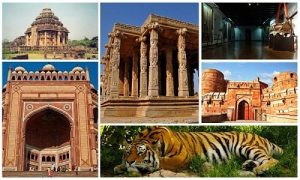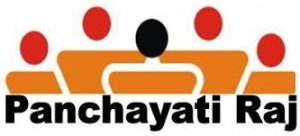Daily Current Affairs for Government Exams:
Today Current Affairs: 25th August 2020 for UPSC IAS exams, State PSC exams, SSC CGL, State SSC, RRB, Railways, Banking Exam & IBPS, etc
Table of Contents
Contents:
- DekhoApnaDesh series:
- 50:50 reservation in Panchayati Raj Institutions (PRIs) :
- No Confidence motion:
- .Electricity Amendment Bill 2020::
- Other important current affairs:
1.DekhoApnaDesh series:

Ministry of Tourism recently organized the 50th webinar titled “Cultural heritage of Hyderabad” under the DekhoApnaDesh series.
DekhoApnaDesh series:
- The Ministry of Tourism is organizing the DekhoApnaDesh webinars with an objective to create awareness about and promote various tourism destinations of India – including the lesser-known destinations and lesser-known facets of popular destinations.
- It also promotes the spirit of Ek Bharat Sreshtha Bharat.
- Some important facts were mentioned in this PIB article. The facts mentioned are important for your Prelims as well as Mains.
Key facts:
- Hyderabad is popularly known as the “City of Pearls” and the “City of Nizams”, and has been the center of a vibrant historical legacy, ever since its inception by the QutubShahi dynasty.
- Muhammad QuliQutb Shahestablished Hyderabad in 1591 to extend the capital beyond the fortified Golconda.
- In 1687, the city was annexed by the Mughals. In 1724, Mughal governor NizamAsaf Jah I declared his sovereignty and founded the Asaf Jahi dynasty, also known as the Nizams.
- Hyderabad served as the imperial capital of the AsafJahis from 1769 to 1948.
Important cultural sites of Hyderabad highlighted in the session:
- Golconda Fort, Hyderabad: Built by the Kakatiya dynasty in the 13th century.
- Chowmahalla Palace: Once the seat of the Asaf Jahi Dynasty. It has bagged the UNESCO Asia-Pacific Heritage Merit Award for Culture Heritage Conservation.
- Charminar: The monument was erected when QuliQutab Shah shifted his capital from Golconda to Hyderabad.
- Mecca Masjid: Completed by Aurangazeb in 1693.
- The bricks used here are believed to be from Mecca, and hence the name.
- Warangal Fort: This fort appears to have existed since at least the 12th century when it was the capital of the Kakatiya dynasty.
2.50:50 reservation in Panchayati Raj Institutions (PRIs) :

The Haryana government is planning to bring a Bill to provide 50:50 reservation in Panchayati Raj Institutions (PRIs) for men and women candidates and rotate the seats between male and female representatives after each term.
- Men and women will be able to contest panchayat polls under the odd-even formula.
- This will be implemented for sarpanches and members of village wards, block Samiti and Zila Parishad.
- Benefit: This will ensure equal opportunities for men and women, and women from all constituencies will have a fair share in terms of reservation.
- The policy of reservation for only one term and rotation of reserved seats and posts of chairperson can hinder the consolidation of leadership qualities among women representatives as it takes time for them to learn the skills of handling and negotiating various conflicting interests within the panchayat.
- To deal with this issue, some states like Kerala, Himachal Pradesh, Odisha, and Karnataka have made provisions for the two-term reservation of seats at PRIs.
- Haryana previously enacted Haryana Panchayati Raj (Amendment) Act, 2015 laying down eligibility criteria to be able to contest Panchayat elections in the state.
- It included disqualification in case of non-completion of minimum educational criteria (like class X pass for general category and Class 8th for SC), non-payment of arrears and debts to co-operative banks or electricity bills, and not having functional toilets at home.
- The Supreme Court upheld this decision arguing that the prescription of an educational qualification is not irrelevant for better administration.
- Also, the criteria for insolvency and toilets will encourage good practices among legislators.
Constitutional Provisions for Women Representation in PRIs:
- The 73rd Constitutional Amendment Act, 1992 mandates a 33.3% reservation for women in PRIs across the country.
- The 73rd Amendment envisages the Gram Sabha as the foundation of the Panchayat Raj System to perform functions and powers entrusted to it by the State Legislatures.
- This has been increased to 50% reservation in several states like Andhra Pradesh, Chattisgarh, Gujarat, Himachal Pradesh, Bihar, etc.
- Out of the 30.41 lakh elected representatives of PRIs, 13.74 lakh (45.2%) are women.
- Article 15 (3) to the Constitution of India empowers the State to make special provisions for women.
- Article 243D provides that one-third of the total number of seats and offices of the Chairpersons in PRIs at each level shall be reserved for women to be allotted by rotation to different constituencies in a Panchayat.
- Such reservations of seats and offices of the chairpersons for women are also within the reservations for SCs and STs in all three tiers of PRIs.
- In order to bring about 50% reservation for women in Panchayats in all States, the 110th Constitution Amendment Bill was introduced in the Lok Sabha in 2009, but it was not passed despite being tabled several times.
3.No Confidence motion:

The no-confidence motion against the Pinarayi Vijayan government was defeated 87-40 in the Kerala Assembly on Monday. The Assembly has been adjourned sine die.
- A no-confidence motion is a parliamentary motion which is moved in the Lok Sabha against the entire council of ministers, stating that they are no longer deemed fit to hold positions of responsibility due to their inadequacy in some respect or their failure to carry out their obligations. No prior reason needs to be stated for its adoption in the Lok Sabha.
- A motion of “No Confidence Motion” against the Government can be introduced only in the Lok Sabha under rule 198.
- The Constitution of India does not mention either a Confidence or a No-Confidence Motion.
- Although, Article 75 does specify that the Council of Ministers shall be collectively responsible to the Lok Sabha.
- A Motion of No Confidence can be admitted when a minimum of 50 members, support the motion in the house.
- The Speaker then, once satisfied that the motion is in order, will ask the House if the motion can be adopted.
- If the motion is passed in the house, the Government is bound to vacate the office.
- A no-confidence motion needs a majority vote to pass the House.
- If individuals or parties abstain from voting, those numbers will be removed from the overall strength of the House, and then the majority will be taken into account.
4.Electricity Amendment Bill 2020:

Aam Aadmi Party has sought permission from the Speaker to table a motion for repealing of the Centre’s three agriculture-related ordinances and Power Amendment Bill-2020.
- It is because AAP argues that these laws are contrary to the federal structure of the country, besides impinging on the rights of the States.
- Few states have accused the Centre of failure to consult the States on the Bill since electricity is on the Concurrent List.
- The Bill seeks to end subsidies. All consumers, including farmers, will have to pay the tariff, and the subsidy will be sent to them through direct benefit transfer.
- This would mean people would have to pay a huge sum towards electricity charges while receiving support through direct benefit transfer later.
- This would result in defaults leading to penalties and disconnection.
- The Bill “divests” the States of their power to fix tariff and hands over the task to a Central government-appointed authority.
- This is discriminatory since the tariff can be tweaked according to the whims and fancies of the Central government.
- The Bill also makes it compulsory for the State power companies to buy a minimum percentage of renewable energy fixed by the Centre.
- This would be detrimental to the cash- strapped power firms.
Other key provisions in the Bill:
- Renewable Energy: It delegates the Central Government with the power to prepare and notify a National Renewable Energy Policy “for promotion of generation of electricity from renewable sources”, in consultation with State Governments.
- Cross Border Trade: The Central Government has been delegated with the power to prescribe rules and guidelines to allow and facilitate cross border trade of electricity.
- Creation of Electricity Contract Enforcement Authority: It has been proposed to be given sole jurisdiction to adjudicate upon matters on the performance of obligations under a contract regarding sale, purchase, and transmission of electricity, which exclusion of this specialized authority’s jurisdiction on the determination of tariff or any other dispute regarding tariff.
Other important current affairs:
1. According to the draft report of the Parliamentary Standing Committee on Science and Technology, the DNA Technology (Use and Application) Regulation Bill, 2018 could be misused for caste or community-based profiling.
- The Bill allows the use of the technology to establish the identity of persons in matters of crime, parentage dispute, emigration or immigration and transplantation of human organs.
- It provides for the establishment of national and regional DNA data banks and each databank will maintain a crime scene index, suspects’ or undertrials’ index and offenders’ index separately.
- A similar bill was passed in Lok Sabha in 2018 but could not be passed in the Rajya Sabha.
- The 2019 Bill was referred to the Parliamentary Standing Committee on Science and Technology, Environment and Forests for examination.
2. A detailed analysis of 25 key field and horticultural crops done by the rating agency Crisil has indicated that per hectare profitability will improve 3-5% year-on-year to Rs. 10,0000 in the Kharif (Summer Crop) Season 2020.
- However, economists say that individual farmers are unlikely to see any hike in their own income.
- Profits are Expected in the Agriculture Sector: Agriculture is one of the few bright spots in an economy ravaged by Covid-19, with good rains expected to boost production and profits, especially in the paddy crop.
- To support farmers in effectively undertaking the post-harvest rabi produce and preparatory work for Kharif crops, Rs. 30,000 crore additional emergency working capital fund through NABARD and Rs. 2 lakh crore of concessional credit has been provided by the government.
- The agriculture sector showed a growth of 5.9% in the last quarter of 2019-2020.
- Impact on the Farmers’ Income: Some economists have opined that despite a hike in overall profits, per capita (per farmer) income may see a dip.
- Reverse migration due to Covid-19 may have resulted in the number of people employed in the agriculture sector this summer rising by up to 16% over farm employment in 2019.
- As per the data from the Centre for Monitoring Indian Economy (CMIE), the farm sector gained 14.9 million jobs in the April-July 2020 period.
3. The National Bank for Agriculture and Rural Development (NABARD) has introduced the Partial Credit Guarantee Programme for Non-Banking Financial Company (NBFC) – Micro Finance Institutions (MFIs).
- The program aims to ensure the unhindered flow of credit in rural areas hit by the Covid-19 pandemic.
- Under the programme, NABARD will provide partial guarantee on pooled loans extended to small and mid-sized MFIs.
- This has come in the backdrop of most MFIs being excluded from the moratorium benefits from banks, creating a dip in collections, resulting in widening asset-liability mismatch, credit downgrades, and spike in the cost of fresh funding.
- NABARD will facilitate Rs. 2,500 crore funding in the initial phase and will further increase the funding.
- The program is expected to cover over 1 million households across 28 states and 650 districts.
- NABARD has signed agreements with Vivriti Capital and Ujjivan Small Finance Bank to roll out the initiative.
Vivriti Capital is a non-banking financial corporation.
4.The Tata Group is planning to get into aggregating its consumer offerings in an all-in-one super app.
- A super app is an omnichannel digital platform, i.e.- a platform developed by a company offering various services and products under one umbrella.
- For example, China’s WeChat, which started out as a messaging app, expanded into payments, cabs, shopping, food ordering, cab services to become a super app.
- A physical world analogy of a super app would be a mall, which allows retail space to various brands and shops across businesses and verticals.
- There is two concepts of super app emergence:
- The concept of the super app first emerged in China and southeast Asia where internet companies like WeChat, Go-Jek and Grab evolved their apps into versatile feature apps.
- Customer Traffic to Services: These companies used the opportunity of customer traffic on their platforms that originally came as social media by offering additional services leading to increased revenue realizations.
5. The Government of India, the Government of Maharashtra, Mumbai Railway Vikas Corporation and the Asian Infrastructure Investment Bank (AIIB) have signed a loan agreement for USD 500 million for Mumbai Urban Transport Project-III.
- Mumbai Urban Transport Project-III (MUTP-3): It is a project supervised and implemented by the Mumbai Metropolitan Region Development Authority to enhance the network capacity, service quality and safety of Mumbai’s suburban railway system. The deadline for the completion of MUTP-3 is 2022.
- Major Objectives:
- Improve traffic and transportation situation in Mumbai Metropolitan Region.
- Institutional development and strengthening.
6. The Assam government has inaugurated a 1.8-km ropeway across the Brahmaputra river and described it as India’s longest river ropeway.
- About the Ropeway:
- Built at the cost of Rs. 56 crore, it extends from Central to Northern Guwahati. It takes eight minutes to traverse the entire length of the ropeway.
- It passes over the mid-river Peacock Island that houses Umananda, a medieval Shiva temple.
- According to the government, this is one of the most advanced & longest river crossing Aerial Tramway systems in India.
- Aerial tramways are particularly well-suited in extreme terrain since the towers can be erected at larger intervals.
7. The Supreme Court has issued a notice on a plea filed by the State of Nagaland for a direction to its Lokayukta to cease exercising his powers and functions and transfer all his work to the Upa-Lokayukta.
- The petition by the State asked the court to use its extraordinary powers under Article 142 of the Constitution to preserve the institutional integrity of the Lokayukta and ensure that a “fit, proper and competent person” occupies the office of the Lokayukta.
- Lokayukta is an anti-corruption authority or ombudsman – an official appointed by the government to represent the interests of the public.
- Most importantly, it investigates allegations of corruption and mal-administration against public servants and is tasked with speedy redressal of public grievances.
8.The Delhi High Court has asked municipal bodies to take steps to prevent the spread of glanders disease in animals including horses and issued notice to the Delhi government and others on an application filed by the People for the Ethical Treatment of Animals (PETA), India.
- In its application, the PETA has sought directions to implement the provisions of the Prevention and Control of Infectious and Contagious Disease in Animal Act, 2009 and National Action Plan for control and eradication of glanders in horses, mules, ponies, and donkeys in the national capital.
- Glanders: is an infectious disease that is caused by the bacterium Burkholderia mallei.
- While people can get the disease, glanders is primarily a disease affecting horses. It also affects donkeys and mules and can be naturally contracted by other mammals such as goats, dogs, and cats.
9. The parliamentary standing committee on science and technology headed by Congress leader Jairam Ramesh has raised few concerns over the DNA Bill.
- DNA data could be misused for caste or community-based profiling.
- The Bill refers to consent in several provisions, but in each of those, a magistrate can easily override consent, thereby in effect, making consent perfunctory (Meaning of perfunctory: performed merely as a routine duty; hasty and superficial).
- There is also no guidance in the Bill on the grounds and reasons of when the magistrate can override consent, which could become a fatal flaw.
- The Bill permits retention of DNA found at a crime scene in perpetuity, even if the conviction of the offender has been overturned.
- The Bill also provides that DNA profiles for civil matters will also be stored in the data banks, but without a clear and separate index.




